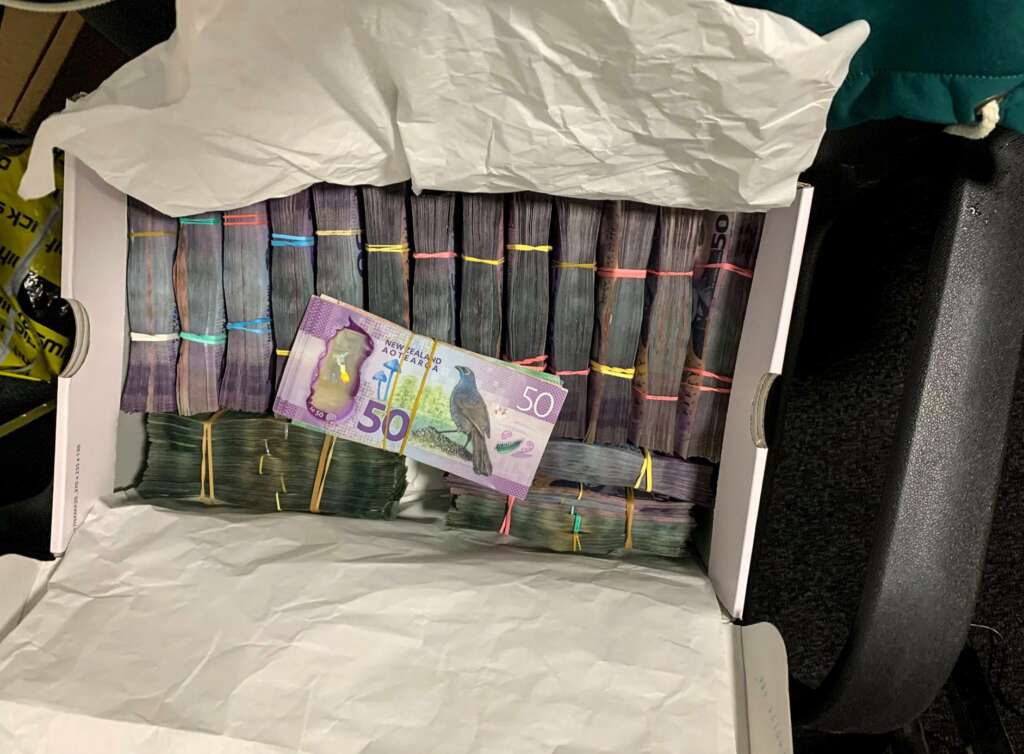
THE HAGUE, Netherlands (AP) — A global sting involving an encrypted communications platform developed by the FBI has sparked raids and arrests around the world, delivering “an unprecedented blow” to crime gangs, law enforcement authorities said Tuesday.
Operation Trojan Shield involved police swoops in 16 nations. More than 800 suspects were arrested and more than 32 tons of drugs — cocaine, cannabis, amphetamines and methamphetamines were seized along with 250 firearms, 55 luxury cars and more than $148 million in cash and cryptocurrencies.
“Operation Trojan Shield is a shining example of what can be accomplished when international law enforcement partners from around the world work together and develop state-of-the-art investigative tools to detect, disrupt and dismantle transnational criminal organizations,” Calvin Shivers, assistant director of the FBI’s Criminal Investigative Division, said at a news conference in The Hague.
It was, said Australian Federal Police Commander Jennifer Hearst, “a watershed moment in global law enforcement history.”
Dutch National Police Chief Constable Jannine van den Berg said the operation dealt “an unprecedented blow to criminal networks, and this is worldwide.”
The seeds of the operations were sown when law enforcement agencies earlier took down two other encrypted platforms, EncroChat and Sky ECC. That meant crime gangs which traffic drugs and organize underworld hits around the world were in the market for new secure phones.
The FBI had just what they needed. An app called ANOM that was installed on modified mobile phones.
“There was a void that was created by a lack of these encrypted platforms,” said Shivers. “So that created an opportunity for collaboration with our international partners, to not only develop the specific tool but also to develop the process of gathering the intelligence and disseminating the intelligence.”
The app formed the backbone of Trojan Shield, an operation led by the FBI that also involved the U.S. Drug Enforcement Administration, the European Union police agency Europol and law enforcement agencies in more than a dozen countries.
The ANOM app was popular and got more popular as criminals told one another it was a safe platform. Over the past 18 months, the FBI provided encrypted devices to more than 300 crime gangs operating in more than 100 countries. That allowed police to look over the shoulders of criminals as they discussed hits, drug shipments and other crimes.
Intelligence gathered and analyzed “enabled us to prevent murders. It led to the seizure of drugs that led to the seizure of weapons. And it helped prevent a number of crimes,” Shivers said.
Earlier Tuesday, authorities in Australia and New Zealand said they’d dealt a huge blow to organized crime after hundreds of criminals were tricked into using the messaging app.
Australian authorities said they arrested 224 people and seized more than four tons of drugs and $35 million in an ongoing operation that dates back three years. New Zealand police said they had arrested 35 people and seized drugs and assets worth millions of dollars.
“Today, the Australian government, as part of a global operation, has struck a heavy blow against organized crime,” Australian Prime Minister Scott Morrison told reporters. “Not just in this country, but one that will echo around organized crime around the world.”
European police last year delivered a major blow to organized crime after cracking an encrypted communications network, known as EncroChat, used by criminal gangs across the continent.
In March, Belgian police arrested dozens of people after cracking another encrypted chat system, called Sky ECC, and seizing more than 17 tons of cocaine.
The latest operation went even further.
“The success of Operation Trojan Shield is a result of tremendous innovation, dedication and unprecedented international collaboration,” Shivers said. “And the results are staggering.”
____
Perry reported from Wellington, New Zealand.
Copyright © 2021 . All rights reserved. This website is not intended for users located within the European Economic Area.
